Argentina profile - Timeline
- Published
A chronology of key events:
16th century - Spanish colonisation of the River Plate coast and inland areas begins.
1776 - Spain establishes separate Viceroyalty of the River Plate.
1810 - Viceroy overthrown, launching the war of independence.
1816 - Independence declared, followed by decades of turmoil, attempted foreign intervention, and civil war between centralist and federalist forces.
1861 - State of Buenos Aires finally reintegrated with Argentine Confederation to form a united country.
1880 - Start of decades of liberal economic and immigration policies that lead to rapid income and population growth as well as progressive education and social policies.
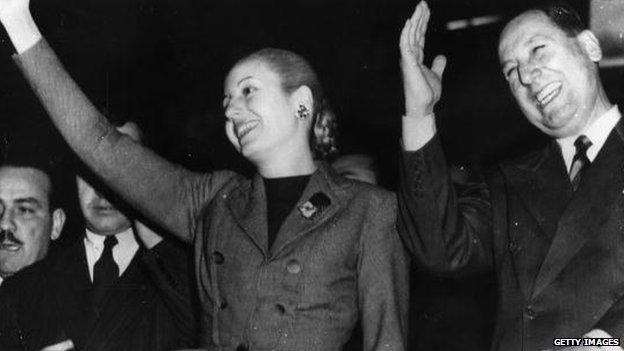
Evita, pictured with husband President Juan Peron, was a powerful figure and enduring icon
1908 - Argentina has seventh highest per capita income in the world.
1912 - Full adult male suffrage introduced.
1916 - Hipolito Yrigoyen of the Radical party is elected president and introduces a minimum wage to counter the effects of inflation. Mr Yrigoyen is elected again in 1928.
1930 - Armed forces coup ousts President Yrigoyen amid sharp economic downturn caused by Great Depression. Civilian rule is restored in 1932, but economic decline continues.
1942 - Argentina, along with Chile, refuses to break diplomatic relations with Japan and Germany after the Japanese attack on the US Pacific fleet at Pearl Harbour.
1943 - Nationalist army officers seize power in protest at stagnation and electoral fraud. One leading figures is Colonel Juan Peron.
1945 - Argentina declares war on Japan and Germany.
The Peron era
1946 - Juan Peron wins presidential election on a promise of higher wages and social security. His wife, Eva 'Evita' Peron is put in charge of labour relations.
1949 - A new constitution strengthens the power of the president. Opponents are imprisoned, independent newspapers are suppressed.
1951 - Peron is re-elected with a huge majority, but his support begins to decline after Evita dies the following year.
1955 August-September - Violent military uprisings drive President Peron to resign and go into exile.
1966 - General Juan Carlos Ongania seizes power after years of unstable civilian government.
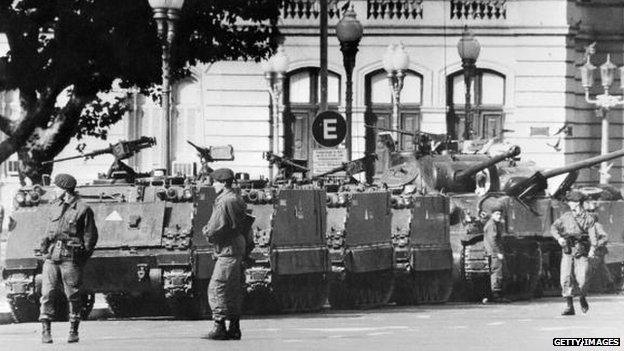
The military seized power in 1976. The dictatorship of General Jorge Videla was characterised by the 'Dirty War' in which opponents were eliminated
1973 - The Peronist party wins elections in March, Peron becomes president in September.
1974 - Peron dies in July. His third wife, Isabel, succeeds him. Terrorism from right and left escalates, leaving hundreds dead amid strikes, protests and rampant inflation.
1976 - Armed forces seize power and launch 'Dirty War' in which thousands are killed on suspicion of left-wing sympathies.
The Falklands War
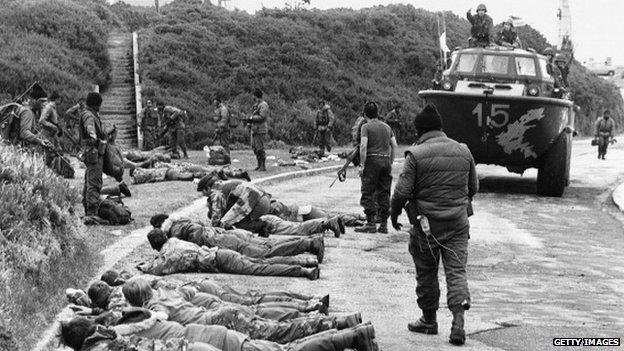
Argentina seized the Falkland Islands in 1982, sparking a 10-week war. British forces suffered setbacks, such as when troops were captured (pictured here), but they eventually retook the territory
1982 April - Argentine forces occupy the British Falkland Islands, over which Argentina has long claimed sovereignty. British task force re-takes islands in June.
1983 - Junta, reeling from Falklands fiasco, restores democracy. Raul Alfonsin becomes president.
1989 - Carlos Menem of the Peronist party is elected president. He imposes an economic austerity programme.
1990 - Full diplomatic relations with the United Kingdom are restored, although Argentina maintains claim to Falklands.
1992 - Argentina introduces a new currency, the peso, which is pegged to the US dollar.
1994 - A Jewish community centre in Buenos Aires is bombed, 86 people are killed, and more than 200 injured in Argentina's worst terrorist atrocity. Prosecutors accuse Iran and its Lebanese Hezbollah allies of responsibility.
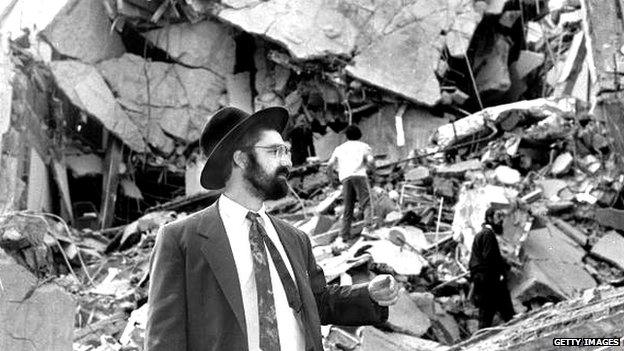
The bombing at Jewish community centre in Buenos Aires remains unresolved
Recession bites
1999 - Fernando de la Rua of the centre-left Alianza opposition coalition wins the presidency, inherits 114 billion-dollar public debt after a year of recession.
2001 July - Much of the country is brought to a standstill by a general strike in protest against proposed government spending cuts. Country's credit ratings slip.
Return of the Peronists
2001 October - The opposition Peronists take control of both houses of parliament in congressional elections.
2001 December - IMF stops $1.3bn in aid, banks shut down. President De la Rua resigns after at least 25 people die in rioting.
2002 January - Congress elects Peronist Senator Eduardo Duhalde as caretaker president. Within days the government devalues the peso, ending 10 years of parity with the US dollar.
2002 November - Argentina defaults on an $800m debt repayment to the World Bank.
Kirchner sworn in
2003 May - Mainstream Peronist candidate Nestor Kirchner wins presidential election.
2003 September - After weeks of negotiations Argentina and IMF agree on debt-refinancing deal under which Buenos Aires will only pay interest on its loans.
2005 June - Supreme Court approves repeal of amnesty law that had protected former military officers suspected of human rights abuses during military rule in 1976-1983. Congress voted to scrap the amnesty in 2003.
2006 January - Argentina repays its multi-billion-dollar debt to the IMF.
Fernandez elected
2007 December - Cristina Fernandez de Kirchner is elected president, succeeding her husband Nestor Kirchner.
2009 July - Legislative elections result in President Fernandez's Peronist party losing its absolute majorities in both houses of parliament.
Row with Britain
2009 December - Argentine parliament passes law claiming Falkland Islands and several other British overseas territories in the area.
2010 February - Argentina imposes new controls on ships passing through its waters to Falkland Islands in response to plans by a British company to drill for oil near the islands.
2011 October - Benefiting from strong economic growth, President Cristina Fernandez de Kirchner wins a second term with a landslide 54% of the vote.
2012 November - Congress approves a law to lower the voting age to 16.
2013 February - Argentina becomes the first country to be censured by the International Monetary Fund for not providing accurate data on inflation and economic growth, under a procedure that can end in expulsion.
2013 March - Falkland Islanders vote overwhelmingly in favour of remaining a British overseas territory.
Cardinal Jorge Mario Bergoglio of Buenos Aires is chosen as Pope. He is the first Latin American to lead the Roman Catholic Church, and takes the name of Francis.
2014 July - Argentina defaults on its international debt for the second time in 13 years, after failing to resolve its differences with US hedge funds that hold 1.3bn dollars worth of bonds, bought at a discount after the country last defaulted.
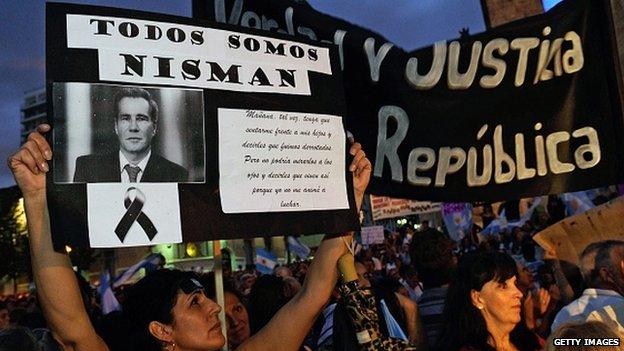
Mystery surrounds the death of prosecutor Alberto Nisman, who was investigating the 1994 bombing of the Jewish community centre
2015 January - Prominent prosecutor Alberto Nisman is found dead in mysterious circumstances, after accusing the government of a cover-up over the country's worst terrorist attack - the 1994 bombing of a Jewish community centre in Buenos Aires that left 85 people dead.
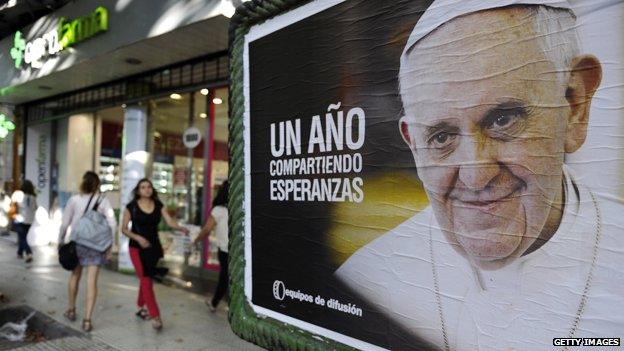
Pope Francis is from Buenos Aires and the first Latin American to lead the Roman Catholic Church
2015 November - Conservative Mayor of Buenos Aires Mauricio Macri beats Peronist Daniel Scioli in run-off presidential election, takes office in December.
2016 February - Argentina agrees to settle multi-billion-dollar dispute with US hedge funds over bond repayments, which had restricted the country's access to international credit markets.
2016 December - Britain and Argentina sign an agreement to identify the remains of 123 Argentine soldiers who died in the Falklands War.
2017 October - Mr Macri's coalition wins decisively in a parliamentary election seen as a referendum on his market reform policies.
2018 May - Government raises interest rates dramatically in an effort to shore up the tumbling value of the peso currency.
2019 October - Peronist candidate Alberto Fernández wins the presidential election, becoming the first challenger to oust a sitting Argentinean president.